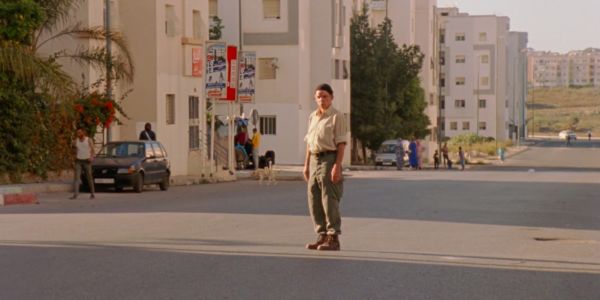Helena Wittmann‘s feature, Human Flowers of Flesh, is a dizzying whip-up of moody emulsion, a heady brew of dreamy realism that evokes the best of the European arthouse of the 1960’s and 70’s all the while retaining her distinct visionary eye for trance-inducing hypno-scenery and leisurely intriguing storytelling. There are traces of the influence of the woozy DNA of Antonioni and Ackerman, but the locus of filmic threads that links Human Flowers of Flesh to the greater contextual lexicon is its subliminal identity as a spiritual sequel or extension of Claire Denis‘ iconic 1999 film Beau Travail as Wittmann sought to revise its central character, legionnaire Galoup played by Denis Lavant.

There’s a divine sense of playful humor here that channels the subtly innovated camp designs implied by Denis‘ movie, its inception, and the way Beau Travail is itself a pseudo-follow-up to Jean-Luc Godard‘s controversial 1963 Le Petit Soldat, picturing the deviant revolutionary-turned deserter Bruno Forestier as a dejected legionnaire in her chicken innards adaptation of Billy Budd played by the same actor, Michel Subor. Wittmann‘s adoption of Galoup is very much in the same vein; brilliantly fitting extension of this ethereal sense of adaptation.
“Breathe me in” the atmosphere of Wittmann’s vision
Helena Wittmann‘s translation of what perked out of the nouvelle vague and then shot through the Claire Denis prism is the gleefully disjointed stuff that tracks with the untrackable certainty of her predecessors. The film’s aesthetic vocabulary is assured; there’s the wafting presence of earthy expression. Opening on a craggy landscape, we see legs and feet cross the frame as they traipse through the coastal region which seems carved with glacial precision. Ida, played by Angeliki Papoulia, walks with two other men to her yacht; she’s gathering a crew for her yacht. Ida corrals sailors from various corners of the world; there’s the Croatian Vlad (Vladimir Vulević) Mauro (Mauro Soares) from Portugal, the German Falco (Steffen Danek), Carlos (Gustavo Jahn) from Brazil, and Farouk (Ferhat Mouhali) from Algeria; their lives are one of motion and stillness, their tasks menial, dull, at first cultivate a swaying humming show of banality that transforms over time into a harmonious display of poetic transience. The value of the coastal atmosphere and the lull and mystique of the sea is the artistic currency, and its value is always present throughout the entirety of the film.
This type of filmmaking has the lure of an arthouse travelog, with, what I like to call the “breathe-me-in” school of filmmaking, not slow cinema, but a commanding presence of Claire Denis-inspired air of beautiful miasma, seductive liminal space, and ever-present motion in delicately composed stillness. The camera has this creeping omniscience with Bressonian intonations.
The tendency to dissect people’s appendages, arms, legs, and hands appear in frame with a ratio that far exceeds traditional compositions, thankfully Wittmann, who is also credited as the cinematographer, doesn’t veer from this discipline, and it’s one of the film many virtues. This cultivates a dynamic array of moments that were calibrated to recognize the uncanny otherness of nature and humans. Wittmann knows the value of her cast, especially its star, Angeliki Papoulia, whose statuesque features are reminiscent of the velvety, calcified beauty of Vicky Kriepes. Regal but informed of a world that invites inquiry and adventure.
The Legionnaires
The first act gets us into the ocean; Papoulia‘s character is as elusive as the film itself; her motivations and resources are a mystery, and we’re better off for it. If you give yourself to the movie and its faintly whispered modus operandi, you’ll happily lose yourself to the sounds of waves, long shots of the water, stealthily conceived moments of nature; at one point, a snail tactfully maneuvers across the frame and its delightful little wink that we can’t laugh with. Once we get to dry land, the increased presence of the legionnaires, and when Denis Lavant turns up, Human Flowers of Flesh truly starts to bloom, opening more of its strange allure.
Pint-sized soldiers (or a “petit sodlat”) perched with machine guns, planes appear from a blue sky, parachutes spilling out of it; we linger on it long enough that it takes on this bizarre presence as if you were cloud gazing, again the recognition of abnormalities that can be ferreted out from the company of ordinary things and people. Here it is bolstered by the colonial allegory of French intervention and the legionaries.
The Claire Denis connections are stitched into the fabric of the film, but the presence of the legionnaires, thanks to our protagonist developing a fascination Wittmann leans into the atmosphere so finely attuned by Denis‘ Beau Travail, and when the immaculate Denis Lavant shows up it’s an understated burst of narrative accelerant.
Wrapping Up
This isn’t a dealmaker or breaker, Human Flowers of Flesh is just as enticing for anyone who has or hasn’t seen Beau Travail, just as Beau Travail is a treat with or without being savvy on the Le Petit Soldat connection.
Helena Wittman’s eye is trained with the expertise not familiar with many recent directors. Along with Alessandro Abate, who’s work on Martin Eden is still the subject of praise from yours truly and Vasco Viana who shot Légua, Wittmann’s contributing to a widening array of inky 16mm photography and we’re all the better for it.
Watch Human Flowers of Flesh
Does content like this matter to you?
Become a Member and support film journalism. Unlock access to all of Film Inquiry`s great articles. Join a community of like-minded readers who are passionate about cinema - get access to our private members Network, give back to independent filmmakers, and more.